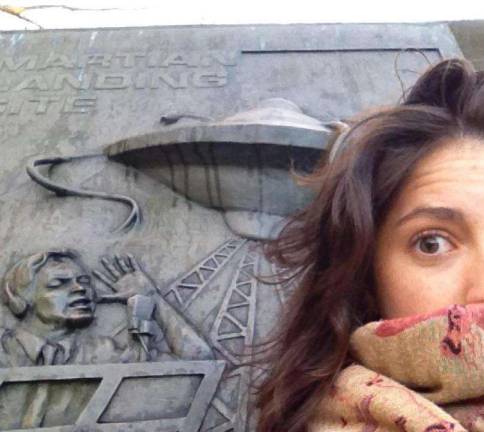Occasionally The Protagonist briefly profiles the work and life of a local artist; this is one of those times. Brooklynite Keara Driscoll waitresses by day and writes poetry...well, whenever she has a spare moment to jot down her thoughts on the scrap of paper she keeps in her pocket. Driscoll has been writing poetry in some form or another since the second grade. "I think I believed all poems had to be about dogwood trees, or ferns, or deer loping into the woods," she said, of her "juvenilia." Now the 26-year-old has an MFA in poetry, anthologized work and invitations to read at popular reading series throughout the city. Driscoll remains humble, however, about her art. She'll accept invitations to read, but seems wary about promoting her own work too much. Perhaps counterintuitively, for Driscoll being busy is crucial to the act of making poetry. "It makes the periods I save for poetry more productive," she explains. "I know I have only a couple of hours between work and class, a half hour to read during a lunch break, etc. Some days I skip buying lunch and sit in the park and write until I have to go back to work." Driscoll says her current lifestyle, dedicated to waitressing and applying to teaching jobs, makes for "the best way to keep a flexible schedule that allows time to write, and provides enough money to live in an expensive city with profound ties to poetry." She adds: "It's also enabled more encounters with whole butchered pigs than a girl could want, and if that's not poetry I have no idea what is." Maybe fittingly, dismembered animal parts often find their way into Driscoll's work. Even for the most seasoned poet, writing doesn't always come easy. All the time in the world can't make eloquent beauty suddenly manifest on the page. Of her process, Driscoll says: "Most days, I stare at my notebook for a while, write that email I've been putting off, clean the shelves in my fridge, make my bed, organize my desk, text all of my friends and THEN finally write, often starting with the phrase, 'I have absolutely nothing to say.'" "It doesn't matter," she explains. "I'm doing it." *** Ghazal that Confuses Humans with Animals by Keara Driscoll Should a harmful force be present a snake could, theoretically, swallow itself up to the head. Imagine! You, your own donut, packed safely in your throat, with only skull exposed. Of course, there is no next step. Close your eyes. Sheath those gooey jewels. Above all, tell no one about the ecstasy of tonguing your own tail. Whoever first inserted foot into mouth was briefly on point. Though s/he failed to recognize that guilt doesn't stop at the ankle. More often, it resides in your nose. You'll have to swab with tree-sized Q-tips. Know also: the results of your throat culture reveal traces of Whoever The Hell's progeny at the top of your tulip. Culture implores you, don't swallow your offspring. You are no shark, no serpent. You are fat-happy heifer, ready to be cleaved for your calves. Low pleasantly as they collapse in pasture. Oh, Ahi! Progenitor of greed. We've been listening to your swelled midsection- don't force our fingers around your windpipe.Don't make us cut you open to take the ocean back. ***
"If I had to make a point, I'd say be a time thief," says Driscoll, in our interview about how a poet finds balance in her life.
"If you work in an office, jot a line or two down during a meeting. Keep a word doc open on your desktop and add to it throughout the day," she says. "Take an order for a mid-rare hanger steak and jot down the word "dulosis" next to it (dulosis is an enslavement of ants by ants.)" Driscoll also emphasizes the importance of sustaining a like-minded community. "Keep close your friends who are as dedicated to the practice as you-they'll keep you involved even when you go a month without finding time to write," she says. To Driscoll, there's no reason to stop writing. "If you've been handed an unfair amount of pain and suffering, write through that pain and suffering," she says. "It might be the only way you understand it, or at least find peace within it. "You started writing poetry for a reason," she adds. "Believe that reason."

